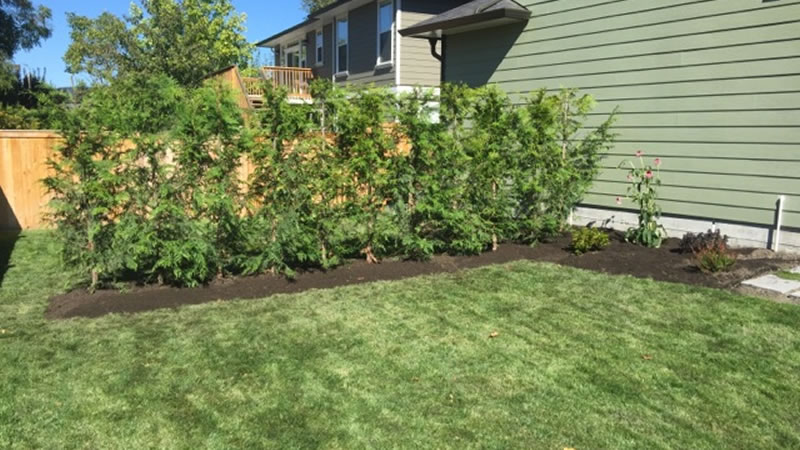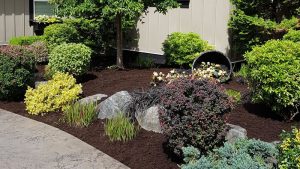
Cedar Privacy Hedges Are An Excellent Investment In Your Property
As your hedge grows it increases your property value and appeal.
Pick any neighborhood or any street in the Greater Vancouver area and you’re bound to find several properties that boast mature cedar privacy hedges. Cedars are an extremely versatile tree and the native BC varieties we have available (Thuja Plicata) do especially well here and are affordable to install.
An attractive feature for home buyers too due to the added shade, privacy and aesthetics of the property. You can expert a mature cedar hedge to add significant value to any property. Fences add privacy and a bit of value too, but when compared to a cedar hedge, they lose.
Fences will need to be repainted every few years and likely replaced every 10 years. Compare that to a cedar hedge, which can live 30-60 years under the right conditions. Yes, fences can be built much faster, but cedars give your property a more natural look, increase your property value more as they mature and they help keep the air you breath clean!
When Is The Best Time To Plant Privacy Hedges In Vancouver?
Autumn is a great time of the year to plant cedar trees on your property because the soil is going to be cool and moist. The growing season is essentially over, but that’s ok because Cedar Trees and Hedges don’t really grow that much the first year anyway. Instead the tree spends it’s energy on developing a good, strong root base from which to collect nutrients and water so it’s ready for some explosive growth when the spring showers hit.
By planting in the autumn you are setting your cedar trees or hedges up for a healthy spring because by the time spring rolls around they will be ready to take advantage of the pristine growing season. If you wait until spring to plant you’ll see very little growth until the following year as it’s going to take a few months for the cedars to establish their roots, in which time the best growing months will have passed.
What Are The Best Species Of Cedars To Plant?
In the lower mainland it’s always best to try and stick with a native variety of cedar that is well adapted for the cold, windy winter months we experience. We have several species that are available at local nursuries.
Emerald Cedars (Thuja occidentalis Smaragd) – Emerald Cedars are probably one of the most frequently purchased hedging shrubs available. They are popular because of their vibrant emerald green foliage that maintains it’s beautiful color year-round (provided you keep them healthy!). Emerald Cedars can grow as tall as 15′ or can be maintained at varying widths and heights.
Excelsa Cedars (Thuja Plicata) – A native Cedar to BC, the Excelsa is a Western Red Cedar that can grow well over 30′ in height when well cared for. Because they are a native tree species they require very little maintenance to reach a healthy size in our environment. They boast dark green foliage that will maintain it’s color throughout the year.
Pyramidalis Cedars (Thuja occidentalis ‘Pyramidalis’) – Pyramidalis is another very popular hedging cedar sometimes also referred to as “Brandon” Cedars. They are difficult to distinguish from the emerald cedars unless you know what to look for and these characteristics become much more prominent in the winter time. Suitable for winter or winter conditions the Pyramidalis will change to a slightly different shade of green during the cooler fall and winter months which makes identification easier.
How Much Will Your Cedar Hedge Cost?
That’s a really good question but a tough one to answer without viewing your property. To give a good ballpark estimate you can count on paying anywhere from $25 – $100 for your cedar trees from a nursery or plant wholesaler. The cost of each tree will depend on the species and overall size (they are available from 3′ high to 8′ in height). You’ll also have any additional expenses that go along with planting and maintaining the cedar trees too such as bringing in additional soil and the labor to do all the work.
Don’t forget the cost of an irrigation system which can be a few thousand dollars to several thousand dollars depending on your property.
Cedar Privacy Hedge Installation Estimates (Minimum Project Cost $500.00) If you’d like an estimate to install a cedar privacy hedge on your property please give us a call or fill out our contact form and someone will be getting right back to you. After a site visit and inspection of the existing conditions we will be able to offer you an accurate estimate.
Tips For Planting and Maintaining Your Cedar Trees or Cedar Hedge
If you want a beautiful, healthy row of cedars on your property then it’s important that care is taken during the planning and planting phase to ensure your new cedars get a good start.
#1. Calculating The Number Of Trees
Determining the location of the hedge is usually fairly easy if you want to plant along a fence or property line. Choosing the exact number of cedar trees to plant and how far apart is more important. Plant them too far apart and you’ll lose the desired affect for privacy and if you plant too many too close to each other they won’t grow as large and healthy as they should.
The ideal distance to plant cedar trees for a hedge or along a property line is approximately 2′ or 60 centimetres. This can vary slightly depending on the size of the cedars you are able to source locally and what type of cedars they are specifically. So if you had a 100′ feet of fence line and you planted a tree every 2′ you’d need 50 cedars to plant along your perimeter.
#2. Soil Conditions
Many homeowners think their soil will be perfect for a hedge and often it’s not. For the best planting results you’ll need to dig a trench for your cedars to be planted in. This should be at least 1′-3′ feet deep at least 2′- 4′ wide. The size of your trench will depend on the size of the trees you are planting and the soil conditions, as you may need to add/remove more material. If the soil conditions on your property vary greatly from the soil in the rootball of your new cedars the roots will have trouble taking in your soil.
Clay or soils with lots of clay can be very hard and tough for roots to penetrate and will need to be amended by bringing in additional material. Cedars like a soil PH of 6.0 – 6.5 for maximum nutrient uptake. Any landscape professional will be able to quickly tell you the condition of your soil and what needs to be done with it for healthy cedar growth.
#3. Irrigation
Cedars can grow rapidly once they have successfully taken root and they do guzzle LOTS of water. For smaller rows of cedars you might be able to get away with hand watering or putting a sprinkler on them regularly. If you have a large row of cedars it’s very wise to have an irrigation system or sprinkler system installed and in fact most nurserys and suppliers of cedar trees will only offer warranty of the trees if you do have a dedicated irrigation system.
Planting cedar trees on your property is an investment and if they are dead or dying from a lack of water they certainly won’t improve property values, if anything they will reduce the value and make the property look less attractive and you’ll likely need to hire a professional to remove and replace the cedars entirely.
An irrigation system will definitely add to the upfront costs of planting a new cedar hedge but when your trees are large and mature and healthy you’ll forget about that because the increase in privacy and property value will have likely offset the cost.
#4. Pruning & Maintenance
If you want a nice, uniform looking cedar privacy hedge then it’s going to need to be pruned at least once per year starting in year 2 to 3. There is much debate on when the best time to prune cedar trees is but if you’re asking the professionals it’s best to do your pruning in the winter or early spring so the tree has ample time to recover for the growing season.
Don’t ever prune back more than 30% of the plant if you want to maintain it’s healthy growth. Pruning back too much of the hedge will cause your cedar to go into a state of shock and will greatly diminish it’s growth rate or kill the tree entirely.
#5. Mulching and Soil Amending
After your cedars are planted you might want to consider adding some leaf or bark mulch to the beds to offer an insulating layer for your new cedars, especially going into winter their first year (if you planted them in the fall). Depending on your soil conditions it might be something you’ll need to address once or twice a year just to make sure the soil remains habitable.
How Will Local By-Laws Affect Where I Can Place My Cedar Trees?
They will, is the short answer. Each municipality is a little different but in general you need to account for a small setback from your property line. This is to ensure you don’t encroach onto your neighbors property and you also have to consider how large these cedars might grow to. Planting a row of trees right on your property line is just asking for trouble, likewise planting the trees along the boulevard in front of your home is too.
Talk with your landscaping professional who will likely be somewhat familiar with the local by-laws as they pertain to tree planting near property lines.


